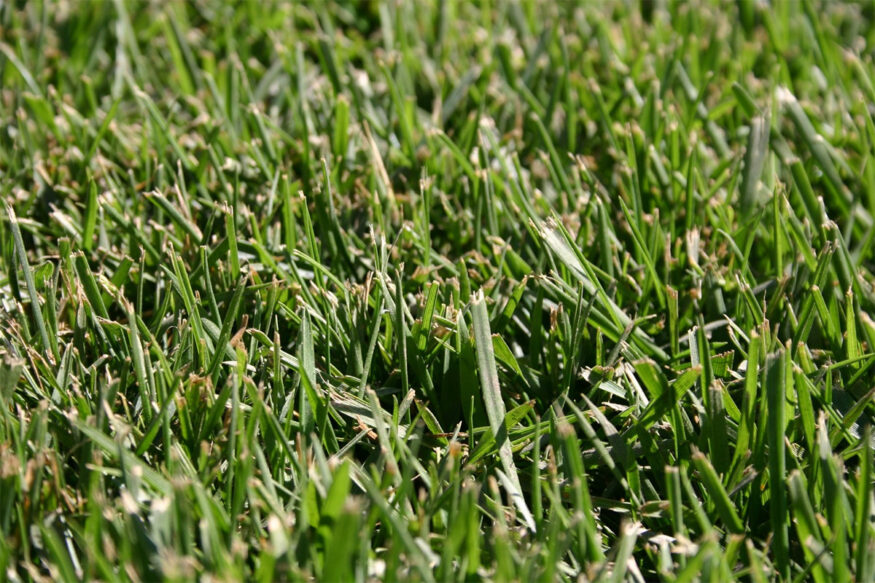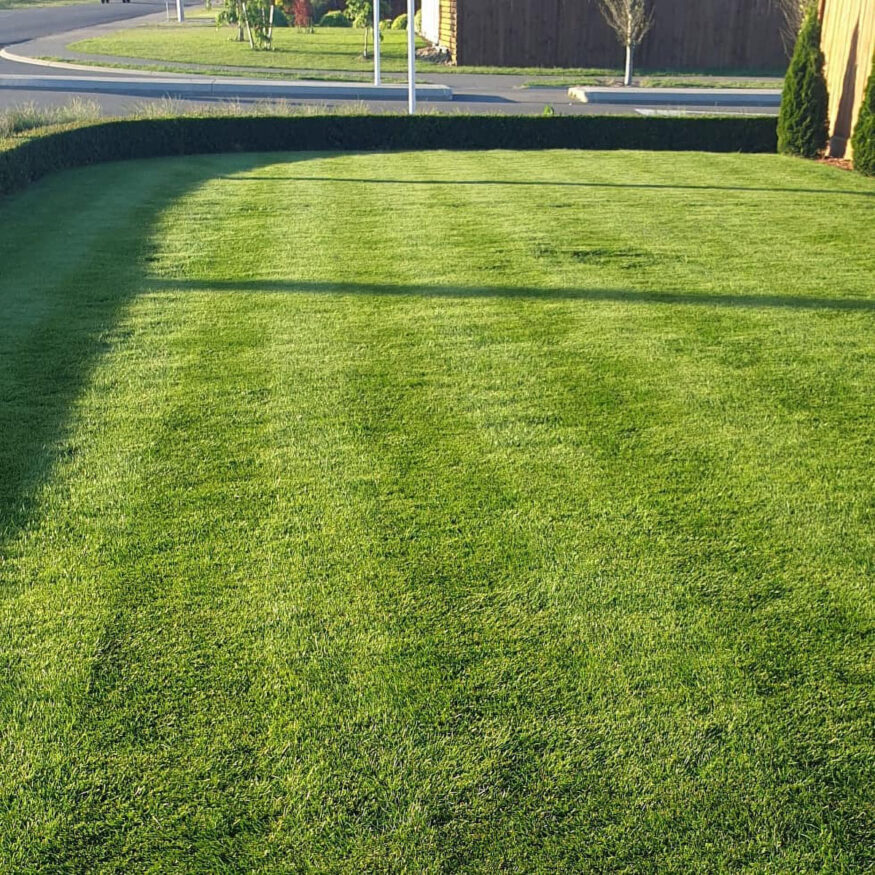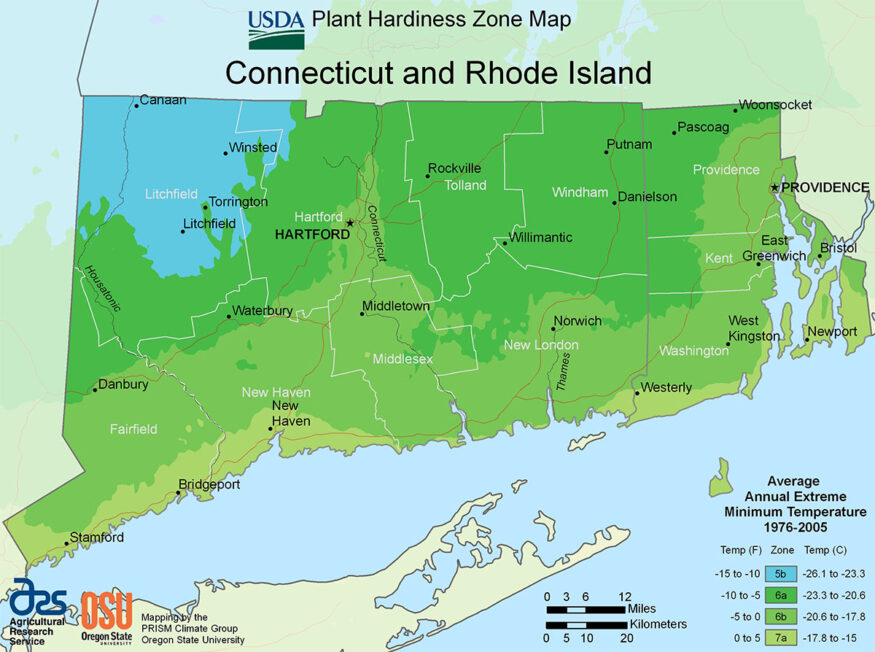Looking for the best grass seed for your Rhode Island lawn? With the state’s unique climate and growing challenges, it’s important to choose a grass type that will thrive in your area. Here are some of the top options to consider.
Kentucky Bluegrass is a popular choice for Rhode Island lawns, as it is well-suited to the state’s cool, moist climate. It is known for its fine texture and deep green color, and is also durable enough to withstand heavy foot traffic. Perennial Ryegrass is another great option for Rhode Island, as it germinates quickly and is able to establish a thick, lush lawn in a relatively short amount of time. Tall Fescue and Fine Fescue are also worth considering, as they are both able to tolerate drought and heat stress, making them ideal for Rhode Island’s hot, dry summers.
Let’s take a look at these grass type options in more detail.
Key Takeaways
- Kentucky Bluegrass, Perennial Ryegrass, Tall Fescue, and Fine Fescue are all good options for Rhode Island lawns.
- Kentucky Bluegrass is well-suited to the state’s cool, moist climate and is durable enough to withstand heavy foot traffic.
- Perennial Ryegrass germinates quickly and is able to establish a thick, lush lawn in a relatively short amount of time, while Tall Fescue and Fine Fescue are able to tolerate drought and heat stress.
Kentucky Bluegrass
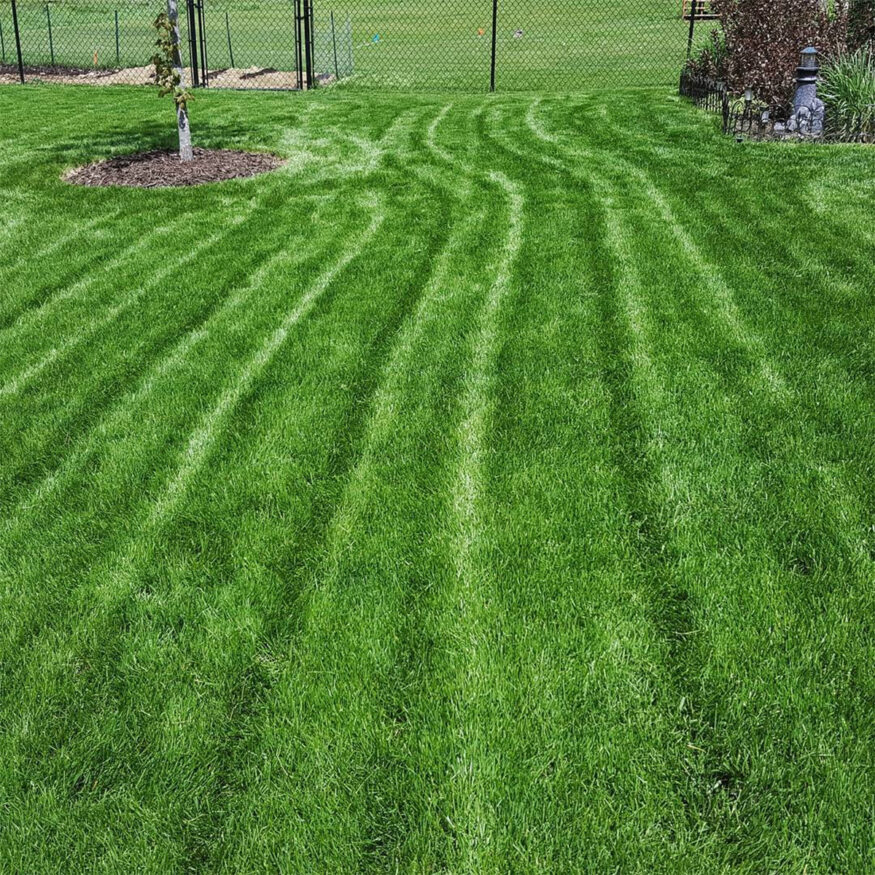 Source: ryanknorrlawncare on Instagram
PIN IT
Source: ryanknorrlawncare on Instagram
PIN IT
| Also Known As | Poa pratensis L. |
| Type of Grass | Cool season perennial |
| Optimal Zones | Northern cool season zone, transition zones |
| Root Structure | Shallow |
| Winter Hardiness | Excellent |
| Shade Tolerance | Poor to Good |
| Water Requirements | High |
| Drought Tolerance | Poor |
| Self Repair Capacity | Excellent |
| Overall Maintenance Requirements | High |
Why Kentucky Bluegrass] is The Most Popular Choice For Rhode Island
Kentucky bluegrass is a popular cool-season grass that can thrive in Rhode Island’s climate. It is known for its dark green color, fine texture, and ability to form a dense carpet-like lawn. This grass type is well-suited for the state’s cool temperatures and growing conditions.
Kentucky bluegrass is ideal for planting in late April to early May when soil temperatures are around 50-65°F, which is the optimal range for seed germination. It has a moderate growth rate and requires regular mowing to maintain a height of 2-3 inches. This grass type prefers full sun but can tolerate some shade.
When planting Kentucky bluegrass, prepare your soil by removing any debris and ensuring the pH level is between 6.0-7.0. It is recommended to use a grass seed mix that contains at least 80% Kentucky bluegrass. Water your seedlings frequently to keep the soil moist, but be careful not to overwater.
Pros:
- Forms a dense carpet-like lawn
- Dark green color
- Fine texture
- Tolerates shade
- Low maintenance needs
Cons:
- Requires regular mowing
- Not heat tolerant
- Slow to establish
To care for your Kentucky bluegrass lawn, fertilize it in the fall and spring with a balanced fertilizer. Water your lawn deeply once a week, and adjust watering frequency based on moisture levels and weather conditions. Mow your lawn regularly at a height of 2-3 inches, and avoid mowing more than one-third of the blade length at a time.
Kentucky bluegrass is a great grass type for Rhode Island that can provide a beautiful and low-maintenance lawn with proper care and maintenance.
Here are two recommended Kentucky bluegrass seed options available on Amazon:
- Outsidepride Midnight Kentucky Bluegrass Seed Blend
- Jonathan Green Blue Panther Kentucky Bluegrass Grass Seed
Learn More: Read our comprehensive state-by-state grass selection guides here.
Looking for the best grass seed for your region?
Our smart lawn plans are designed to work perfectly with your local soil and climate conditions, without any of the toxic stuff.
Use the code EHG20 for an instant $20 discount!
- Personalized lawn care: Custom lawn plans based on soil analysis, climate data, and your specific lawn needs.
- Convenience with a conscience: Products that are not only easy to use but also safe for you, your pets, and the planet.
- Science-backed formulas: Bio-based formulas contain effective, natural ingredients like seaweed, molasses, and iron.
- Expert support: Get one-on-one guidance from a real person and rest easy with Sunday's satisfaction guarantee.
Perennial Ryegrass
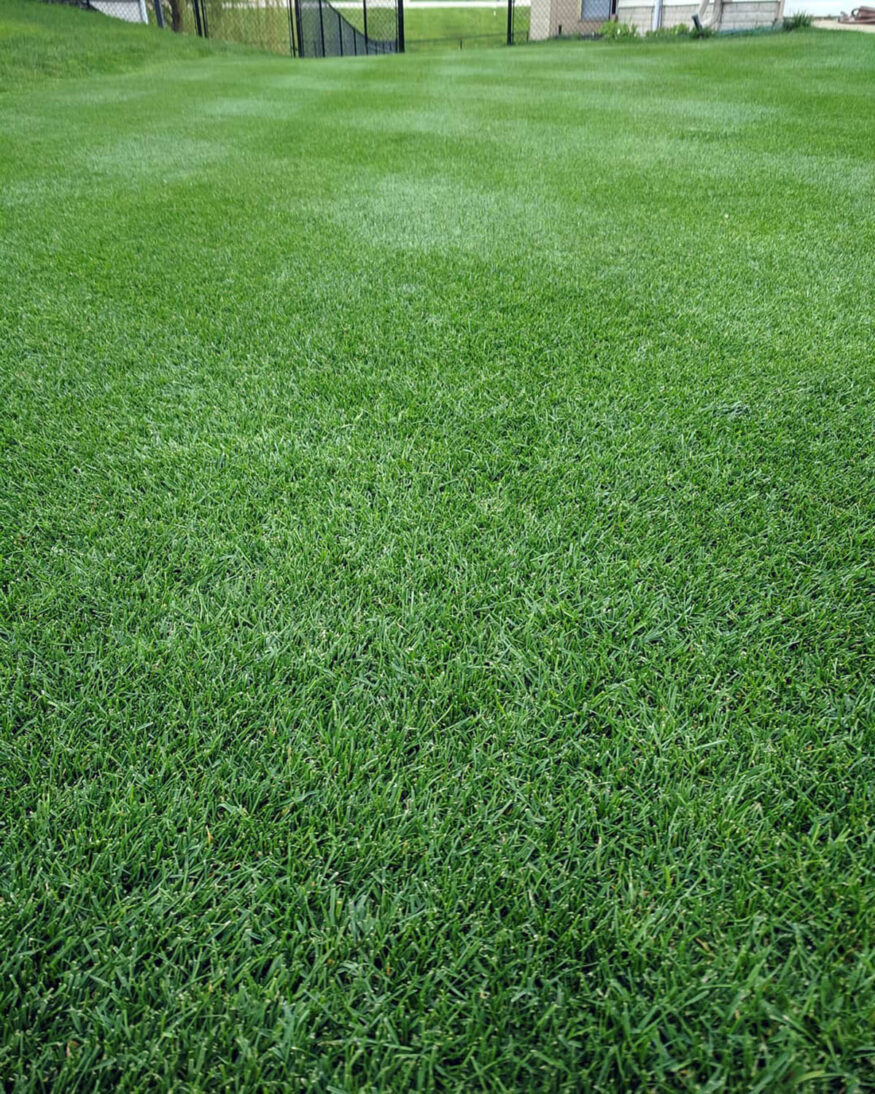 Source: ryanknorrlawncare on Instagram
PIN IT
Source: ryanknorrlawncare on Instagram
PIN IT
| Also Known As | Lolium perenne L. |
| Type of Grass | Cool season perennial |
| Optimal Zones | Mild northern zones |
| Root Structure | Deep |
| Winter Hardiness | Good to excellent |
| Shade Tolerance | Moderate |
| Water Requirements | High |
| Drought Tolerance | Good |
| Self Repair Capacity | Excellent wear tolerance |
| Overall Maintenance Requirements | Moderate to high |
What Makes Perennial Ryegrass A Great Grass For RI
If you’re looking for a grass seed that can thrive in Rhode Island’s cool temperatures, then Perennial Ryegrass is an excellent choice. This cool-season grass can grow in full sun or shade areas and is known for its dark green color and fine texture.
Perennial Ryegrass is a great option for those who want a low maintenance lawn. It has a high tolerance for traffic and requires less fertilizer than other grass types. It also has a quick germination period, usually taking 5-10 days to sprout.
It is particularly suited for the coastal areas of Rhode Island due to its salt tolerance. It is also a great option for overseeding existing lawns or planting a new lawn.
When planting, make sure to prepare your soil by removing any debris and weeds. Perennial Ryegrass prefers a soil pH of 6.0-7.0 and needs to be watered regularly to ensure adequate moisture.
For best results, sow the grass seed in late April to early May. The seedlings should be mowed to a height of 2-3 inches once they reach 3-4 inches in height.
Here are some pros and cons of using Perennial Ryegrass in Rhode Island:
Pros
- Dark green color and fine texture
- Tolerates traffic well
- Requires less fertilizer than other grass types
- Quick germination period
- Salt tolerant
- Great for overseeding or new lawns
Cons
- Not as cold-tolerant as other grass types
- Does not spread through rhizomes, so it may take longer to establish a full lawn
- Requires regular watering to maintain moisture levels
Perennial Ryegrass is a great option for those looking for a low maintenance, fine-textured lawn that can tolerate traffic and salt. With proper care and maintenance, it can provide a beautiful lawn for your Rhode Island home.
Two of our recommended Perennial Ryegrass seed options are:
Looking for the best grass seed for your region?
Our smart lawn plans are designed to work perfectly with your local soil and climate conditions, without any of the toxic stuff.
Use the code EHG20 for an instant $20 discount!
- Personalized lawn care: Custom lawn plans based on soil analysis, climate data, and your specific lawn needs.
- Convenience with a conscience: Products that are not only easy to use but also safe for you, your pets, and the planet.
- Science-backed formulas: Bio-based formulas contain effective, natural ingredients like seaweed, molasses, and iron.
- Expert support: Get one-on-one guidance from a real person and rest easy with Sunday's satisfaction guarantee.
Tall Fescue
| Also Known As | Lolium arundinaceum (formerly Festuca arundinacea) |
| Type of Grass | Cool season perennial |
| Optimal Zones | Northern through transition zones |
| Root Structure | Deep |
| Winter Hardiness | Excellent |
| Shade Tolerance | High |
| Water Requirements | Medium to High |
| Drought Tolerance | Excellent |
| Self Repair Capacity | Limited |
| Overall Maintenance Requirements | Low |
Why Tall Fescue Grows well in Rhode Island
Tall fescue is a cool-season grass that is well-suited for Rhode Island’s climate. It is a popular choice for lawns because of its deep roots, which make it drought-tolerant, and its shade tolerance. Tall fescue is also known for its low maintenance needs, making it an attractive option for homeowners.
When planting tall fescue in Rhode Island, it is best to do so in the spring, between late April and early June. This is when the soil temperature is optimal for seed germination. To prepare your soil, make sure it is well-drained and has a pH between 6.0 and 7.0.
When planting tall fescue grass seed, it is important to sow at a rate of 5 to 8 pounds per 1,000 square feet. It is also recommended to use a grass seed mix that is specifically designed for the region.
Once your tall fescue is established, it is important to maintain it properly. Mowing height should be kept between 2.5 and 3.5 inches, and it should be watered deeply once a week.
Fertilizer should be applied in the fall and spring, and it is important to avoid over-fertilizing, which can lead to thatch buildup.
Pros:
- Drought-tolerant due to its deep roots
- Shade tolerant
- Low maintenance needs
- Good for erosion control
Cons:
- Not as cold-tolerant as some other grass types
- Not as heat-tolerant as some other grass types
- Can be slow to establish
Tall fescue is a good choice for Rhode Island homeowners looking for a low-maintenance lawn that can tolerate a variety of growing conditions. It is particularly well-suited for shaded areas and can be used for erosion control on slopes.
Check out these two Tall Fescue options that we have had good results with:
- Pennington The Rebels Tall Fescue Grass Seed Mix
- Premium Oregon Grown Kentucky 31 Tall Fescue Grass Seed
Fine Fescue
| Also Known As | Hard fescue, strong creeping red fescue, slender creeping red fescue, sheep fescue, chewings fescue; Festuca L. |
| Type of Grass | Cool season perennial |
| Optimal Zones | Northern zones |
| Root Structure | Medium |
| Winter Hardiness | Excellent |
| Shade Tolerance | Excellent |
| Water Requirements | Medium to High |
| Drought Tolerance | Excellent |
| Self Repair Capacity | Limited |
| Overall Maintenance Requirements | Low |
Why Fine Fescue Is a Popular Grass seed Choice
Fine fescue is a cool-season grass that is well-suited for Rhode Island’s climate. It is an excellent choice for homeowners who want a low-maintenance lawn that requires less mowing, watering, and fertilization than other grass types. Fine fescue is also known for its shade tolerance, making it an ideal choice for lawns with a lot of trees.
Fine fescue is a type of grass seed that is easy to plant and grow. It can be planted in the spring, starting in late April, when soil temperatures are around 50°F. Fine fescue grass seed needs to be planted at a depth of ¼ inch, and seedlings should start to emerge within 7 to 14 days. Fine fescue is also known for its excellent germination rate, which means that you will have a successful lawn in no time.
Fine fescue has a dark green color and a fine texture that makes it an attractive option for lawns. It is also known for its low maintenance needs, which means that you will spend less time and money caring for your lawn. Fine fescue grass seed mix is also available, which can provide a more diverse and resilient lawn.
This grass also a high shade tolerance, making it an ideal choice for lawns with shaded areas. It is also tolerant of cool temperatures and has good heat tolerance. Fine fescue is best suited for well-drained soils with a pH between 5.5 and 7.5.
To prepare your soil for planting fine fescue grass seed, you should remove any debris and weeds, loosen the soil to a depth of 6 inches, and add fertilizer as needed. When planting fine fescue, it is important to keep the soil moist until the grass seedlings have established roots. Once established, fine fescue should be watered deeply once a week.
When mowing fine fescue, the recommended mowing height is 2 to 3 inches. Mowing too short can damage the grass and reduce its ability to grow. Fine fescue requires less fertilizer than other grass types, but it is still important to fertilize your lawn at least once a year to keep it healthy.
Pros
- Low maintenance
- Shade tolerant
- Good heat tolerance
- Dark green color
Cons
- Not as durable as other grass types
- Requires well-drained soil
- Not suitable for heavy foot traffic
- Slower to establish than other grass types
Fine fescue is an excellent choice for homeowners in Rhode Island who want a low-maintenance lawn that requires less watering, mowing, and fertilization. It is particularly well-suited for lawns with shaded areas and requires less fertilizer than other grass types. With proper care, fine fescue can provide a lush and attractive lawn that will thrive in Rhode Island’s growing conditions.
Here are two recommended Fine Fescue grass seed options:
Rhode Island’s Climate And Growing Challenges For Lawns
Climate
Rhode Island has a humid continental climate, with warm summers and cold winters. The average temperature in July is around 70°F, and the average temperature in January is around 30°F.
This means that you need a grass seed mix that can tolerate both hot summers and cold winters.
Soil Conditions
Rhode Island’s soil is generally acidic, with a pH ranging from 4.8 to 6.6. This means that you need a grass seed mix that can tolerate acidic soil. You may need to add lime to your soil to raise the pH level.
Weeds
Rhode Island has a variety of weeds that can invade your lawn, including crabgrass, dandelions, and clover. To prevent weeds, you should choose a grass seed mix that is dense and can outcompete weeds. You can also use herbicides to control weeds.
Pests & Diseases
Rhode Island’s lawns can be susceptible to pests and diseases, such as grubs, chinch bugs, and brown patch.
To prevent pests and diseases, you should choose a grass seed mix that is resistant to these problems. You can also use pesticides and fungicides to control pests and diseases.
Other Challenges
Rhode Island’s lawns can face other challenges, such as shade, full sun, and moisture. To choose the best grass seed mix for your lawn, you should consider the amount of shade and sun your lawn receives, as well as its moisture needs. You should also choose a grass seed mix that has low maintenance needs, so you don’t have to spend too much time and money on lawn care.
| Challenge | Solution |
|---|---|
| Acidic soil | Add lime to raise pH level |
| Weeds | Choose a dense grass seed mix and use herbicides |
| Pests & Diseases | Choose a resistant grass seed mix and use pesticides and fungicides |
| Shade, full sun, and moisture | Choose a grass seed mix that meets your lawn’s needs |
| Low maintenance needs | Choose a grass seed mix that requires minimal care |
Looking for the best grass seed for your region?
Our smart lawn plans are designed to work perfectly with your local soil and climate conditions, without any of the toxic stuff.
Use the code EHG20 for an instant $20 discount!
- Personalized lawn care: Custom lawn plans based on soil analysis, climate data, and your specific lawn needs.
- Convenience with a conscience: Products that are not only easy to use but also safe for you, your pets, and the planet.
- Science-backed formulas: Bio-based formulas contain effective, natural ingredients like seaweed, molasses, and iron.
- Expert support: Get one-on-one guidance from a real person and rest easy with Sunday's satisfaction guarantee.

